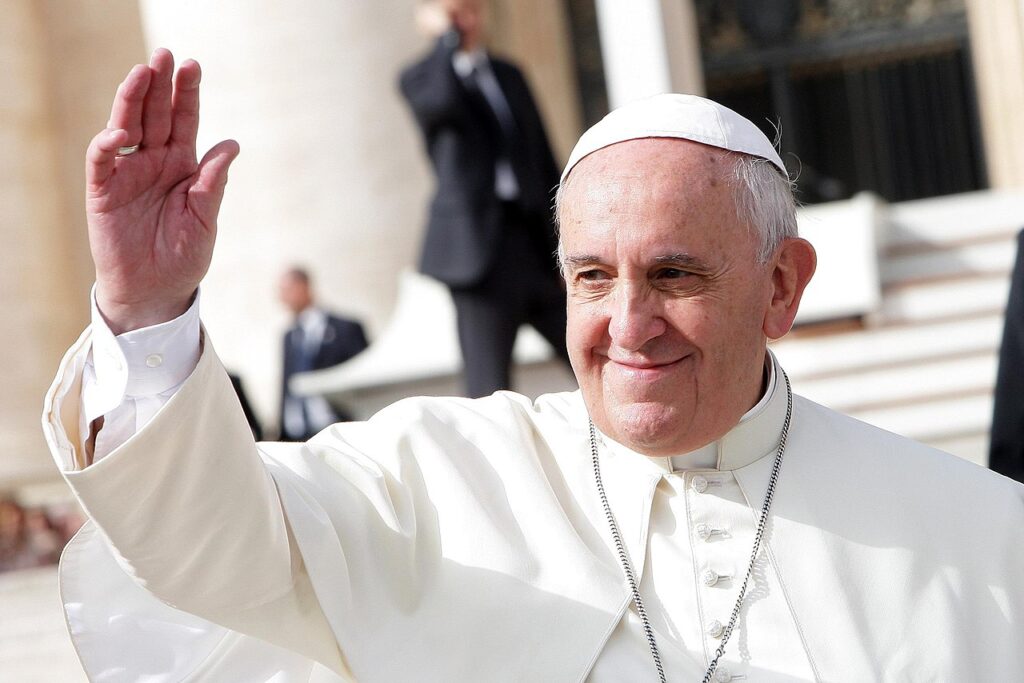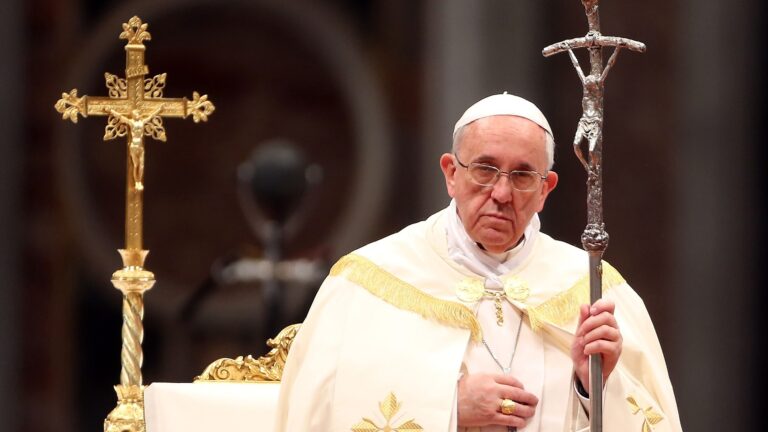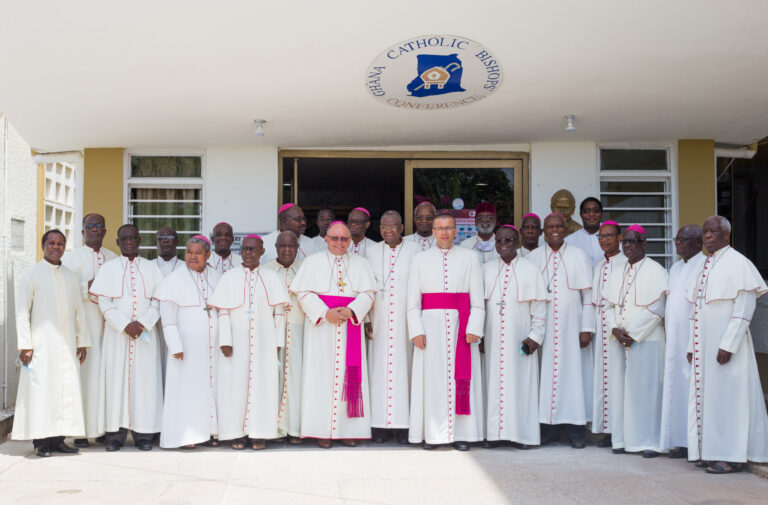Pope Francis recently said—and not for the first time–that the Church and its members are paying far too much attention to what he called “issues below the belt.”
His nonchalance about sexual sins—the kinds of behaviors that are explicitly rejected by the Sixth and Ninth Commandments—also goes a long way towards explaining Fiducia Supplicans, in which Pope Francis and Cardinal Victor Manuel Fernández allow “blessings for couples in irregular situations and for couples of the same sex.”
After all, if you think that the Church has paid too much attention to “below the belt” issues over the past two millennia, then why not bestow blessings upon homosexual couples (even if you must pretend, for form’s sake, that you are not blessing them “as a couple”)?
Everyone understands by now that the current occupant of the Chair of St. Peter is given to making confused and confusing statements. His deemphasis of sexual sins deserves special notice, however, since it is so jarringly at odds with the world we find ourselves in.
We live in a society that is as sex-drenched as Sodom was in its heyday and, in a way, even more perverted.
- Internet pornography is not only ubiquitous, it is ever more violent, bestial, and degrading. Priests have told me that they are hearing more and more men—and even woman—confess to viewing porn regularly, if not to being addicted to it.
- Many of our so-called elites specialize in carnal pursuits, with hundreds flying off to Epstein’s orgy island or his New Mexico ranch/brothel on the so-called Lolita Express so they could cavort with girls as young as 14 that he had recruited on the promise of a modeling career.
- The sexualization of children in schools has gone well beyond the Heather has Two Mommies stage of ten years ago and now involves the open promotion of gay porn in the schools under the rubric of “sex education.” Books so filthy that they are not allowed to be read out loud at school board meetings are passed out to junior high school students barely into puberty.
The list goes on and on.
In the matter of ignoring the sins of the flesh, the Pope is his own best example. He has repeatedly protected, even elevated to the bishopric, those credibly accused of sins “below the belt.” These include several of his auxiliary bishops in Buenos Aires, and a growing number of priests, bishops and archbishops in Rome, as ably summarized recently by Henry Sire, author of Dictator Pope . This pattern of behavior dates back decades, to his earliest days as an auxiliary bishop of Buenos Aires.. This pattern of behavior dates back decades, to his earliest days as an auxiliary bishop of Buenos Aires.
On the other hand, he and his acolytes are quick to remove anyone who points out the gravity of sexual sins. Cardinal McElroy of San Diego, for instance, several years ago removed a priest for preaching openly against homosexuality, while Francis himself stripped Bishop Strickland of his diocese for his defense of unchanging Church teaching, which included leading a rosary rally against the so-called Nuns of Perpetual Indulgence, a group of drag queens who mock Holy Orders with their dress and behavior.
The pope’s most expansive statements on “below the belt” issues came in a book-length interview with a French reporter, Dominique Wolton, published in 2018. When Wolton proposes that the “most radical” message of the Gospel is the “condemnation of money madness,” Francis is quick to agree:
“It is because some prefer to talk about morality, in their homilies or from the chairs of theology. There is a great danger for preachers, and it is that of condemning only the morality that is – pardon me – ‘below the belt.’ But other sins that are more serious, hatred, envy, pride, vanity, killing another, taking a life… these are rarely mentioned. Get into the mafia, make clandestine deals…”
Warming up to his topic, Francis announces:
“Sins of the flesh are the lightest sins. Because the flesh is weak. The most dangerous sins are those of the spirit. I am talking about angelism: pride, vanity are sins of angelism. Priests have the temptation – not all, but many – of focusing on the sins of sexuality, what I call morality below the belt. But the more serious sins are elsewhere.”
Wolton is all sympathy, telling Francis that his message is “not understood.” Thus encouraged, the pope goes on to praise those he calls “good priests” who simply shrug off sins of the flesh:
“I know a cardinal who is a good example. He confided to me, speaking of these things, that as soon as someone goes to him to talk about those sins below the belt, he immediately says: ‘I understand, let’s move on.’ He stops him, as if to say: ‘I understand, but let’s see if you have something more important. Do you pray? Are you seeking the Lord? Do you read the Gospel? He makes him understand that there are mistakes that are much more important than that. Yes, it is a sin, but… He says to him: ‘I understand’: And he moves on.”
Now, to me as a Catholic layman, the most radical message in the Bible is not about greed, lust, or pride at all. It is rather that we imperfect beings must strive to overcome all of our imperfections until we perfectly reflect the goodness of God. As St. Matthew notes in his Gospel, Jesus concluded his Sermon on the Mount with this challenge: “So be perfect, just as your heavenly Father is perfect.” (Matthew 5:48)
This is absolutely daunting, since it leaves no room for error or equivocation in any sinful matter, no matter how small. We are here in this vale of tears to gain mastery over all our evil impulses, including the bodily ones.
Yet the deadliest sins remain, all seven of them, and they are all by definition soul-destroying. And among these, in the present age, sins of the flesh are responsible for ruining more souls than by Francis’ “angelic sins” of pride and vanity.
How do we know this? Because Our Lady told us so. She herself warned the children of Fatima during her May 13, 1917, apparition—and through them all the rest of humanity—that “More souls go to Hell because of sins of the flesh than for any other reason.”
If this was true a century ago, it is even more true now, as soul-destroying pornography destroys minds, marriages, and families, as hundreds of thousands of children are sex-trafficked around the world, and as tens of millions of their unborn brothers and sisters are sacrificed to abortion each year.
Given all this, it seems a dereliction of duty for the holder of the Keys of Peter to diminish in any way the evil of sexual sin. Averting one’s eyes from evil does not make the evil go away, it merely weakens our resolve to resist it when it next strikes.
When Our Lord came upon the woman caught in adultery, he first dismissed the men who were about to stone her to death, preventing a violation of the Fifth Commandment. Then, seeing her contrition, he forgave her past violations of the Sixth Commandment. Finally, he exhorted her to remain chaste by saying “Go and sin no more.”
Christ did not say, “Sins below the belt are not important.”
Perhaps someone should remind the pope of this passage.
******
Steven W. Mosher is the president and CEO of the Population Research Institute. His most recent book, The Devil and Communist China, will be available on March 19th.











